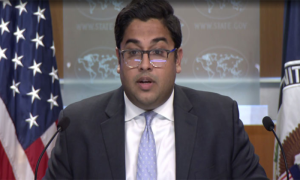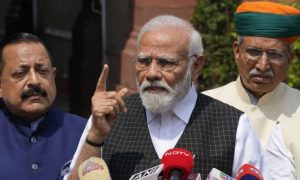WARSAW, Poland: Polish opposition leader Donald Tusk is currently grappling with a formidable challenge as he strives to unseat the nationalist conservative government in Poland’s upcoming parliamentary election.
The former prime minister and one-time European Union leader made his return to Polish politics several years ago with the aim of rejuvenating his languishing party and regaining power. His goal is to reverse what many perceive as a degradation of fundamental rights and strained ties with European partners under the governing populist Law and Justice party.
Tusk, now 66, is pinning his hopes on a significant rally that he has meticulously organized for the upcoming Sunday, seeking to energize his supporters. However, he is facing a range of obstacles, including divisions within the opposition and, more critically, formidable government forces depicting him as disloyal to the nation.
The campaign narrative is significantly influenced by a protracted and bitter personal rivalry between Tusk and Law and Justice chief, Jaroslaw Kaczynski, who is effectively the nation’s leader at 74 years old. Government figures and state media repeatedly assert that Tusk’s time as prime minister from 2007 to 2014 was detrimental to Poland, citing his close relationship with then-German Chancellor Angela Merkel as evidence. Unproven allegations suggest he represented the interests of Germany, the neighbouring country that brutally occupied Poland during World War II. Additionally, Tusk is accused of abandoning Poland when he assumed the role of European Council president in Brussels in 2014.
Tusk has consistently denied the allegations and dismissed claims of partisanship toward Germany. His “March of a Million Hearts” planned for Sunday, just two weeks before the October 15 vote, represents a significant campaign effort. Despite trailing Law and Justice in opinion polls, Tusk is keen to harness the momentum generated by a previous successful march on June 4, which saw hundreds of thousands of opposition supporters from across Poland.
One of Tusk’s major challenges is to persuade his supporters that the incumbent party can indeed be defeated, despite its consolidation of significant power. He emphasizes the need to believe in victory and removing what he terms as “evil people from power.”
To counter the narrative of being unpatriotic, Tusk has adopted a campaign symbol—a heart in the national colors of white and red—representing the unity of all citizens with Poland in their hearts. The previous June 4 march had galvanized a wave of solidarity, coming on the heels of Law and Justice passing controversial legislation establishing a state commission to investigate Russian influence in Poland, seen as a targeted move against Tusk.
However, Tusk faces challenges within the opposition itself. While his electoral alliance, the Civic Coalition, is poised to compete with Law and Justice, divisions within the opposition complicate efforts to unify their strategies. The Third Way, a coalition of the centrist Poland 2050 party and the agrarian Polish People’s Party (PSL), will not participate this time, creating further division.
Political analysts view this disunity as a hurdle, partly stemming from Tusk’s leadership style, which has led some members to leave the party and align with other groups. Despite being a charismatic leader with vast political experience, Tusk’s reputation for a domineering approach within his party has influenced internal dynamics.
Tusk’s recent strategic shift to the left, aimed at appealing to women and younger voters, has triggered disagreements within his party on issues like abortion. This shift has seen members defect, emphasizing the need for a more inclusive and flexible approach to party leadership.























